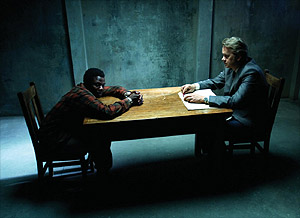
| HOME |
| NERVE |
| REVIEWS |
| ARCHIVE |
| EVENTS |
| LINKS |
| ABOUT US |
| CONTRIBUTORS |
| BACK ISSUES |
| CONTACT US |
 Catch
A Fire (12A)
Catch
A Fire (12A)
Directed by Phillip Noyce
Written by Shawn Slovo
Screening at FACT (24th March - 5th
April 2007)
Reviewed by Adam Ford
This tale of Apartheid era South Africa pairs Rabbit-Proof Fence director Phillip Noyce with writer Shawn Slovo, whose father was one of Nelson Mandela's right hand men in the struggle against the white Afrikaner regime.
Based on real events, the film focuses on the life of Patrick Chamusso (Derek Luke). At the beginning, he is a foreman at the Secunda oil refinery, who tries to ignore politics so he can afford nice things for his wife Precious (Bonnie Mbuli) and their two young children. When the military wing of the African National Congress attack his strategically important workplace, first Patrick then his wife are pulled in and interrogated. Patrick comes to believe that there will be no future for his kids unless Apartheid is brought down, and gets involved in another attempt to blow the refinery sky high.
Catch A Fire is a tension-racked and intensely moving account of Apartheid's last days, which confirms Noyce's role as one of Hollywood's most socially-conscious directors (though there isn't much competition for that honour). The way he treats historical details with thought, care and respect is reminiscent of Ken Loach's best work, and the scenes between Patrick Chamusso and his police interrogator (Tim Robbins) are distinguished by fine acting on both sides.
However, Noyce seems to have taken Shawn Slovo's version of events at face value, despite the fact her father is in the screenplay! As the white leader of the South African Communist Party, Joe Slovo formed an alliance with the black nationalist ANC, becoming a commander of the mainly black armed forces.
When Mandela was released from prison and became the first black President of South Africa, he made Slovo housing minister. But that government introduced policies which benefited a narrow layer of black businessmen and women, whilst condemning working class blacks (and whites) to ever greater poverty. Yes, they have a vote every few years nowadays, but they are learning to relish that just as little as we do in the northern hemisphere.
In his autobiography, Mandela bragged: 'There will always be those who say that the Communists were using us. But who is to say that we were not using them?'
Great though Catch A Fire is artistically, the last fifteen minutes only serve the fiction that purely national or ethnic 'liberation' movements are the answer for poor people in colonised nations, and that we can all rest easy because everything is coming up roses in South Africa.